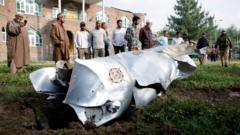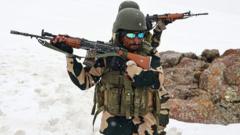Recent explosions in Muzaffarabad signal an alarming increase in conflict between India and Pakistan, raising concerns over a potential military escalation.
Explosions in Pakistani Kashmir Amid Rising India-Pakistan Tensions

Explosions in Pakistani Kashmir Amid Rising India-Pakistan Tensions
Tensions escalate as explosions are reported in Pakistani Kashmir following India's vow to retaliate for a deadly terrorist attack.
In the early hours of Wednesday, residents in Muzaffarabad, the capital of Pakistan-administered Kashmir, reported hearing explosions. These incidents follow India's vow to retaliate against Pakistan for a terrorist attack that resulted in the deaths of over two dozen civilians on April 22. Eyewitnesses noted the sound of jets overhead, and it appears that a site linked to the militant group Lashkar-e-Taiba was targeted during the strikes.
The mass shooting that ignited these tensions left 26 tourists dead and led to injuries for several others, making it one of the deadliest attacks on Indian civilians in years. India quickly accused Pakistan, its primary adversary and a nuclear neighbor, of complicity in the incident, although the Pakistani government has vehemently denied any involvement.
In response to the tragic event, India announced various punitive measures directed at Pakistan, including threats to disrupt a vital river system that supplies water to the region. Following the attack, Indian forces initiated a widespread crackdown in Kashmir, arresting hundreds as they pursued the assailants. Reports indicate a steady exchange of small-arms fire along the border between the two nuclear powers while they have intensified their military posturing.
The recent explosions signal a dangerous escalation that could potentially spiral into a catastrophic conflict. Pakistani officials had previously claimed they would respond to any acts of Indian aggression, igniting fears of a large-scale military confrontation that could have dire consequences for both nations.
The situation remains fluid, with the prospect of further escalation looming as both sides brace for additional fallout from this ongoing crisis.
The mass shooting that ignited these tensions left 26 tourists dead and led to injuries for several others, making it one of the deadliest attacks on Indian civilians in years. India quickly accused Pakistan, its primary adversary and a nuclear neighbor, of complicity in the incident, although the Pakistani government has vehemently denied any involvement.
In response to the tragic event, India announced various punitive measures directed at Pakistan, including threats to disrupt a vital river system that supplies water to the region. Following the attack, Indian forces initiated a widespread crackdown in Kashmir, arresting hundreds as they pursued the assailants. Reports indicate a steady exchange of small-arms fire along the border between the two nuclear powers while they have intensified their military posturing.
The recent explosions signal a dangerous escalation that could potentially spiral into a catastrophic conflict. Pakistani officials had previously claimed they would respond to any acts of Indian aggression, igniting fears of a large-scale military confrontation that could have dire consequences for both nations.
The situation remains fluid, with the prospect of further escalation looming as both sides brace for additional fallout from this ongoing crisis.





















